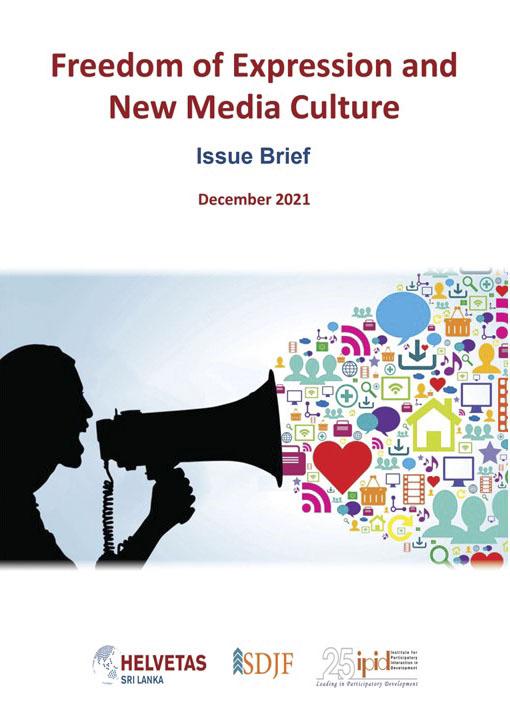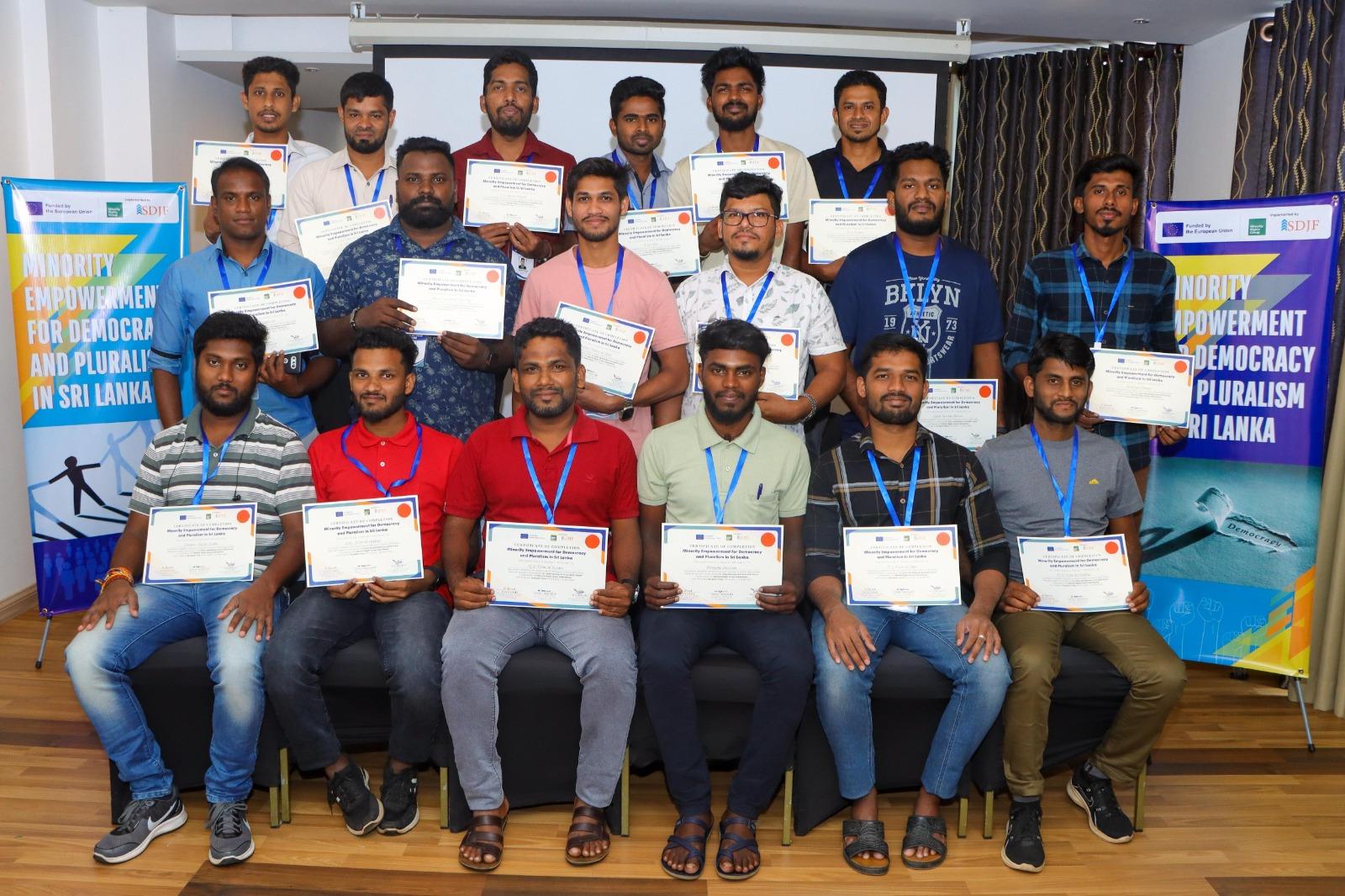New Media Culture enables Digital Identities of Youth in Sri Lanka
20 June 2022 | SDJF_Admin

The role of new media in creating digital identities among users, mainly youth, in Sri Lanka has a considerable impact in the making of the new media culture in the country and how the freedom of expression has evolved. Further, during the COVID-19 pandemic new media avenues have been used tremendously to disseminate information and even in building and transforming local and international businesses. These are some of the key findings of the comprehensive national research on “Freedom of Expression and New Media Culture in Sri Lanka” conducted by HELVETAS Intercooperation gGmbH and Sri Lanka Development Journalist Forum (SDJF) through Institute for Participatory Interaction in Development (IPID) between July 2021- December 2021. To share the findings of the research with the general public, academia, media institutions and civil society, a Press Conference will be organized by Helvetas and SDJF, on 30th June 2022 in Colombo.
Findings of the research further reveals that a considerable majority of those in 15 to 29 age group (78.7%) can be considered as active users of Internet as they indicate daily usage of the Internet. In mapping the new media landscape in Sri Lanka, this demonstrates a high engagement of the Internet and new media outlets by the youth which signifies an active digital presence of Internet users in the country. Majority of these users have initiated and continued using Internet by themselves without any outside support.
Reinforcing the idea of creating digital identities, majority (55.6%) from the 15–29-year age group indicated that they use internet to access social media platforms in relation to purposes of Internet usage. Of the social media platforms used in Sri Lanka, Facebook, WhatsApp and YouTube were used the most by those in both the youth group as well as the Influential group of the research. The youth reported of using a wide range of social media platforms namely: Instagram, TikTok, Snapchat and Viber. Similar to global trends, Facebook is the most popular platform in Sri Lanka with an approximate number of 7 million users and 3.8 million users who can be reached via Messenger. Instagram and LinkedIn are the next two popular platforms with each platform averaging 1.3 million users.
When presented with specific scenarios on how they would report certain issues such as incidents of corruption, gender-based violence or harassment – a high majority of respondents indicated that they would opt to not do anything. These results demonstrate a strong sense of reluctance among youth to express their beliefs and opinions on social media which indicates that there is a prevalent fear among online users in Sri Lanka on their safety when expressing opinions of this nature. However, since March 2022, the new media landscape has changed in terms of expressing issues like corruption online. To reveal corruption and raise their voice on such issues, youth now opt to use social media. A majority of respondents in the research also indicated that it is easier to express themselves on social media as opposed to in real life. This in turn shows the dichotomy between real life versus digital life as respondents feel that in the digital landscape, there is a higher degree of freedom of expression opposed to physically expressing oneself.
With the increase in using new media and social media, the spread of “fake news” in new media has been increasing as an issue that requires a solution. Sri Lanka’s cabinet of ministers in 2021 have approved a proposal to draft a “Fake News” bill to combat “false and misleading statements on the Internet”. Modeled after Singapore’s Protection from Online Falsehood and Manipulation Act (POFMA) which has gained controversy for being a tool for government propaganda and controlling free speech and the media, it is crucial that any new legislation introduced to combat fake news, misinformation and disinformation in Sri Lanka does not infringe on human rights and allow individuals to express themselves freely.
Sri Lanka is in the zone of no media freedom in the International Press Freedom Index. Sri Lanka ranks 127th out of 181 countries in the world21. According to 2020 report by Freedom House, which calculates media standards internationally, Sri Lanka ranks 56th in the last 100 countries in the International Press Freedom Index. Sri Lanka ranks 33rd out of 60 countries for violating political rights. Sri Lanka is ranked 127th out of 180 countries in the Media Freedom Index, according to the International Standards Report by Reporters Without Borders. In 2021, Sri Lanka has got only 50% marks in the Freedom House Internet Freedom Index.
Recommendations of the Research
Various improvements in new media avenues for community and grassroots voices to reach district and policy levels are recommended by the research.
These include:
- Educating the public on the range of new media platforms available to them to express themselves in socially responsible manner.
- Improving media literacy at the community level to increase social change; and
- Adapting university curricula to include new media technologies to equip emerging young generation with the knowledge and skills on new media and freedom of expression.
In order for these recommendations to take effect, relevant authorities and officials need to ensure the provisions in existing legislation promoting freedom of expression are effectively implemented; amending draconian laws that prevent freedom of expression and information rights in online and offline spaces; combat political bias by Media entities; making public aware about their rights and responsibilities in expressing themselves in new media; improve the interaction of media watchdog groups on accountability of various groups i.e. politicians, government representatives and other stakeholders, need to be addressed.
The overall objective of this research is to obtain a comprehensive understanding on the use of new media, and new media landscape (culture) for promoting freedom of expression in Sri Lanka. In assessing the landscape of new media in Sri Lanka, the research gained a deeper understanding as to the key actors and stakeholders, the main consumers of new media outlets, user-behavior patterns, and the overall ecology of the freedom of expression in new media in Sri Lanka. The IPID implemented the research throughout the island (all 9 provinces) with a specific focus on new media used by the youth between the ages 15 to 29. Moreover, an Influential Group (age 40 to 68) survey questionnaire was also administrated to selected parents of those who categorized in the 15 to 19 years age range to obtain further analyses on their perception of new media usage and behavior of their children as well as their own involvement in engaging in the new media.
This research is carried out as a part of Incubator Spaces for Promoting Information Rights and Freedom of Expression (InSPIRE) project implemented by Sri Lanka Development Journalist Forum in partnership with Helvetas and funded by European Union.
For more information and to read the report, please log in to www.ldjf.org
Latest News

SDJF and MIM Launch Sri Lanka’s First Certificate Course on Ethical Reporting and Minority Protectio
27 February 2025
[ Read More ]

Kicking off 2025 with positivity and teamwork!
3 January 2025
[ Read More ]

SDJF Partners with HELVETAS to Launch EMPOWER: Tackling Youth Radicalization and Building Resilience
10 December 2024
[ Read More ]

SDJF Concludes Successful Annual General Meeting 2024
30 November 2024
[ Read More ]

Empowering Sri Lanka’s Next Generation of Journalists: A Journey Toward Ethical and Inclusive Media
20 October 2024
[ Read More ]